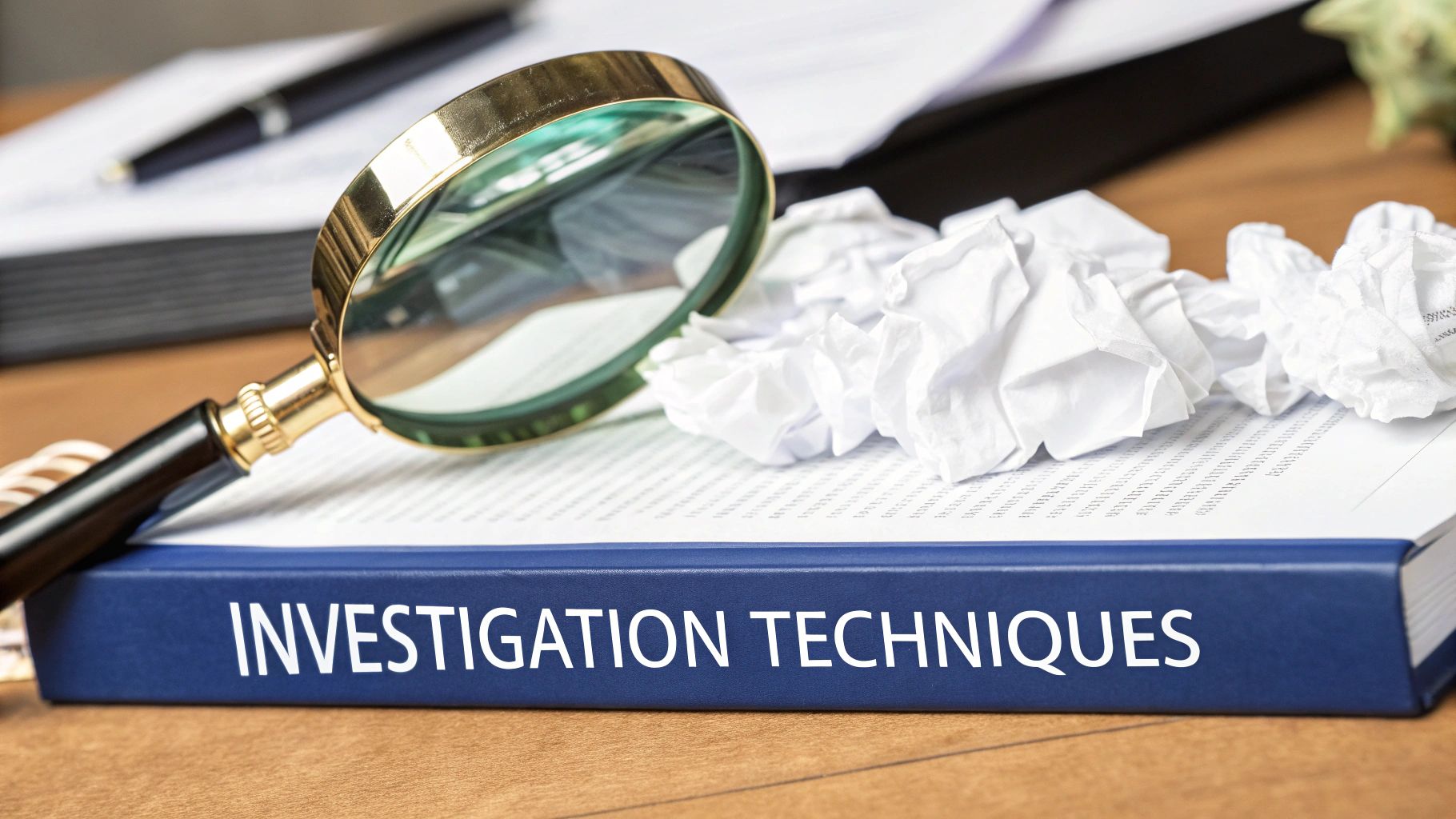How to Hire a Private Detective UK: Your Essential Guide
- Showix technical Team
- Jun 14
- 12 min read
Updated: Jul 14
Understanding the UK Private Investigation Landscape
The world of private investigation isn't like the movies. Forget the dramatic car chases; it’s much more about painstaking research, careful observation, and a lot of legwork. Talking to people who’ve actually hired a PI in the UK paints a much clearer picture.
This isn't your grandad's dusty office filled with cigarette smoke and filing cabinets either. Technology plays a massive part these days. Think digital forensics, advanced surveillance equipment, and in-depth online database searches. Understanding the Role of a Private Investigator in Modern Cases provides a fascinating glimpse into this.
But don't get me wrong, the human element is still absolutely key. It takes experience and gut instinct to connect the dots and draw accurate conclusions. These investigators aren’t just tech-savvy; they’re experts at reading people and situations. That’s the real art of the job.
Modern investigators handle a surprisingly diverse range of cases. Everything from corporate fraud and matrimonial investigations to missing persons and background checks falls under their remit. The industry has become increasingly specialised because the demands are just so varied. Tracing a missing person, for instance, requires a completely different set of skills than, say, uncovering a complex financial fraud. This specialisation is a real bonus for clients, as you can pinpoint an investigator with the precise expertise your specific case requires.
The UK private investigation industry has grown significantly recently. Discover more insights. This growth is driven by rising demand from all sorts of areas, both corporate and personal. Businesses, for example, face constant threats like intellectual property theft and employee misconduct, while individuals might need help with anything from infidelity concerns to locating a lost relative. Investigators meet these needs by providing specialised expertise, making their services incredibly valuable. This increased accessibility also means more choices and, ideally, better results. Understanding this helps you set realistic expectations and choose the right specialist.
Spotting Professional Investigators From Pretenders

So, you’re thinking about hiring a private investigator in the UK. It’s a big step, and let's be honest, finding the right one can feel a little like navigating a minefield. There are some truly excellent professionals out there, but unfortunately, you’ll also find some who aren’t quite what they seem. Knowing how to separate the wheat from the chaff is essential.
One of the first things you’ll bump into is the question of qualifications. Unlike, say, solicitors or doctors, there’s no single, legally-mandated qualification required to become a PI. This can make things a bit murky, but it doesn’t mean everyone operating is unqualified. Look for memberships with professional bodies like the Association of British Investigators (ABI) or the Institute of Professional Investigators (IPI). These organisations have rigorous codes of conduct and specific entry requirements, offering a much-needed layer of reassurance.
Also, think about their experience. A solid track record of successful cases speaks for itself. Don’t shy away from asking about their specialisations, either. Just like any profession, private investigation has its niches. Some investigators specialise in corporate fraud, others in matrimonial cases, and so on. Choosing someone with experience relevant to your specific situation dramatically increases your odds of a positive outcome.
Practical Considerations When Hiring a Private Investigator
It’s also crucial to consider the practicalities. Is the investigator properly insured? Do they adhere to data protection laws, especially with GDPR being so important these days? These things aren’t optional. A good investigator will happily discuss these aspects openly and transparently. Speaking of numbers, the estimated number of private investigators in the UK has hovered around 10,000 for years. Interestingly, this figure isn’t based on solid research but was initially used to illustrate the industry's size. Discover more insights. This highlights the importance of doing your own due diligence and not relying on general industry statistics. Ultimately, finding the right private detective in the UK requires careful consideration and research. Don't rush the process.
Understanding Investigation Costs and Maximising Value
Hiring a private investigator isn't a one-size-fits-all thing. It's not like buying a loaf of bread. The costs can change depending on how complicated the case is, how long it takes, and the specific skills needed.
Think of it like hiring any other professional. A quick background check is going to be much cheaper than a complicated surveillance operation that might take weeks of work and specialised equipment. Daily rates can vary wildly too, depending on the investigator’s experience and expertise. And don't forget those added expenses: travel, database access fees, and equipment rentals. Understanding these costs is just as important as understanding any other investment, like putting together a solid book proposal example, so you know what to expect. For a deeper dive into these costs, check out this helpful resource: How Much Does a Private Investigator Cost? Key Factors in 2025.
Budgeting and Value for Your Investment
It’s tempting to just fixate on that initial quote. I get it. But looking at the bigger picture is key. That rock-bottom price might seem appealing upfront, but what if the investigator cuts corners or simply isn't up to the task? You could end up spending more in the long run to fix the mistakes or start over. The UK's investigation activities sector is expected to generate around $351.24 million USD in revenue. This growth shows just how much demand there is, both from businesses and individuals. You can find more details on the projected investigation activities revenue in the United Kingdom.
Instead of chasing the cheapest deal, focus on value. A slightly higher daily rate for a highly experienced and reputable investigator could actually save you money by delivering fast, effective results and avoiding costly errors. Think expertise, not just price.
Setting a realistic budget from the outset, discussing expected costs openly with your investigator, and agreeing on clear payment terms will prevent any nasty surprises down the line. This also helps you set boundaries and prevents investigations from dragging on unnecessarily, giving you the best bang for your buck. The goal, after all, is to get the information you need efficiently and within your budget.
To help you understand typical costs, I’ve put together a handy comparison table:
Private Detective Service Costs Comparison Breakdown of typical costs for different types of investigation services in the UK
Service Type | Daily Rate Range | Additional Costs | Typical Duration |
|---|---|---|---|
Background Check | £300 - £500 | Database access fees | 1-3 days |
Surveillance | £500 - £800 | Travel, equipment rental | Variable, often several days |
Locating Missing Persons | £400 - £700 | Travel, database access fees | Variable, can be weeks or longer |
Corporate Investigations | £600 - £1000+ | Specialist expertise fees, travel | Variable, often complex and lengthy |
This table gives you a general idea, but remember these are ranges. Actual costs can vary. Discuss specifics with your chosen investigator. The table helps you compare different service types and what factors might influence the final cost. For example, surveillance often involves more unpredictable costs like travel and equipment, while background checks are generally more straightforward.
The Consultation That Reveals Everything

This image perfectly captures a good consultation: focused attention, open communication, and a real sense of partnership. It’s not just about firing off questions; it’s about building a relationship based on trust. Think of your initial consultation with a UK private investigator as the first, crucial step. It’s your chance to see if they’re the right fit for your needs. This goes beyond just checking their qualifications; it’s about their approach, how they communicate, and whether you feel comfortable sharing sensitive details with them. This initial conversation can truly make or break your case.
One of the biggest regrets I hear from people is not asking enough of the right questions up front. I've had clients tell me, “I wish I’d asked about their experience with cases similar to mine.” Being specific is key. Don't just ask if they handle "matrimonial cases." If your situation involves hidden assets or international investigations, ask about that specifically.
Also, be sure to ask how they handle sensitive information. Inquire about their data protection policies and how they ensure confidentiality. A professional private investigator will happily address these concerns and explain their procedures. This shows their commitment to ethical practices and legal compliance – vital for a smooth investigation.
Uncovering Expertise Through Conversation
Remember, this consultation goes both ways. The investigator is assessing your case, and you’re assessing them. Use this opportunity wisely. Don't hesitate to dig into their methods. How do they plan to approach your case? What specific techniques will they use? Their answers will speak volumes about their expertise and experience. Are they vague? Evasive? Or do they provide clear, concise explanations that show a deep understanding of the investigative process?
Pay close attention to how they communicate. Do they really listen? Are they genuinely interested in what you have to say? A good investigator will ask insightful questions, clarify the details, and demonstrate a real commitment to understanding your needs. This builds the foundation for a strong working relationship, which is essential for navigating the complexities of any investigation. You need someone you can trust, someone who keeps you informed and gives you honest, realistic assessments.
Finally, talk about timelines and reporting. How long do they estimate each phase of the investigation will take? How often will they provide updates? What will their reports look like? Setting clear expectations from the beginning prevents misunderstandings and keeps everyone on the same page. Look for transparency and a willingness to keep you in the loop. A good working relationship is built on clear communication and mutual respect, and that paves the way for a successful outcome. This conversation can reveal whether the investigator is truly confident or just over-promising. Realistic timelines, clear communication, and a comfortable rapport are key to a positive experience. Walk away feeling confident in their abilities and comfortable with their approach.
Staying Within Legal and Ethical Boundaries

Communication is key when you're dealing with a private investigator, especially when it comes to legal and ethical stuff. Hiring a PI in the UK is perfectly legal, but that doesn't give them free rein. Even the best private detective in the UK has to operate within a set of rules. Understanding these boundaries protects both you and the integrity of your case. Think of it like knowing the rules of the road – essential for a smooth journey.
The Legal Landscape for Private Investigators
Several key laws govern how private investigators operate in the UK. The General Data Protection Regulation (GDPR), for example, dictates how personal data is handled and protected. GDPR is a big deal, and investigators need to be fully compliant. They also have to respect the right to privacy under the Human Rights Act 1998. This means forget about those Hollywood scenes of breaking and entering or phone tapping – that’s not how it works in real life. These laws are there for a reason: to protect individual rights and prevent abuses of power.
Another important factor is trespass law. Investigators can’t just wander onto private property without permission. This is a big misconception, often portrayed inaccurately on TV. Illegally obtained evidence is inadmissible in court, making it completely worthless. That's why choosing a reputable, law-abiding investigator is paramount.
Ethical Considerations and Professional Standards
Legal compliance is one thing, but ethics are equally important. Reputable investigators adhere to codes of conduct set by professional bodies like the Association of British Investigators (ABI) and the Institute of Professional Investigators (IPI). ABI and IPI set high standards for their members, ensuring they operate ethically and responsibly.
A truly professional PI will be completely transparent about their capabilities and limitations. They’ll explain the legal boundaries of their work and ensure everything they do is above board. Sometimes, that means saying "no" to certain requests. This isn’t a sign of incompetence, but a mark of true professionalism. If you want a more detailed understanding, booking a consultation to discuss your specific situation is always a good idea. You can easily Book A Consultation to get the ball rolling.
Understanding these legal and ethical boundaries isn’t just about avoiding trouble; it’s about ensuring your investigation is conducted effectively and responsibly. A good private investigator knows how to get results while staying within the confines of the law. This is why you need someone with the experience to navigate these often-complex situations. Knowing these boundaries upfront will save you potential headaches later, ensuring your investment yields valuable, legally obtained results.
Managing Your Investigation and Measuring Progress
So, you've hired a private investigator in the UK. Great first step! But the journey doesn't end there. Managing the investigation and understanding its progress is just as vital. Think of it like renovating your house – you wouldn’t just hand over the keys to the builders and disappear, right? You'd want regular updates, open communication, and to know things are moving in the right direction.
Realistic timelines are essential. Every case has its own quirks, of course, but a seasoned investigator should give you a reasonable timeframe for each stage. Remember, unexpected hiccups can happen. Surveillance, for instance, might be delayed by a sudden downpour or a change in the subject’s routine. A true professional will keep you in the loop about any setbacks and explain their adjusted plan.
Clear communication is paramount. Decide upfront how often you’ll receive updates and what they’ll contain. Some people prefer detailed weekly reports, while others prefer a quick chat. Whatever your style, setting clear expectations from the get-go prevents confusion and builds trust. Make sure you know how your data will be handled, too, by reviewing their Privacy Policy.
Interpreting Reports and Evaluating Evidence
Investigative reports can sometimes be a bit dense. Don't hesitate to ask your investigator to explain anything that's unclear. They should be able to break down the significance of the evidence – photos, witness statements, financial records – in plain English. After all, it's your investigation, so you need to understand the information being gathered.
It's also important to learn the difference between real progress and just spinning wheels. Ask yourself: Are the updates meaningful? Are they pushing the investigation forward? Or do they feel like padding? A good investigator focuses on delivering tangible results, not just clocking in hours.
Handling the Emotional Aspects and Preparing for Outcomes
Let's face it, investigations, particularly personal ones, can be tough emotionally. It’s crucial to recognise this and have ways to cope. A decent investigator will be sensitive to this and offer support when needed. Remember, you're not alone in this.
Preparing for different outcomes is also key. What happens if the investigation confirms your suspicions? What if it doesn't? Talking these scenarios through with your investigator helps you brace yourself mentally and emotionally. This way, you’re better equipped to make informed decisions about what to do next, ensuring the investigation serves its purpose. Knowledge is power, and the more you grasp about the process, the more confidently you can handle the results and move forward.
Making Your Choice and Moving Forward With Confidence
Choosing a private investigator (PI) in the UK can feel overwhelming. You’ve done your research, weighed up the pros and cons, and now you need to make a decision. Don't second-guess yourself! This is about trusting your instincts and taking that first step forward.
I've spoken with lots of people who've hired PIs, and what really makes a difference in that final decision often boils down to a few key things. First, how well did you connect with the investigator? Did they really listen? A good rapport is so important. Second, do they have experience with cases like yours? A generalist PI might not be the best choice for a complex financial investigation, for instance. And finally, were they upfront about costs and how they work? Did they clearly explain their fees, estimated timelines, and how they’ll keep you informed? Transparency is key.
Preparing for the Investigation Process
So, you've chosen your PI. Now what? Preparation is crucial, but it’s about smart preparation, not getting lost in the weeds. Don't feel like you need to compile every single detail of your life. Instead, focus on gathering any documents that might be relevant, such as emails, photographs, addresses – anything you think might be helpful. Think of it like packing for a trip: bring the essentials, not your entire wardrobe.
Then, talk to your investigator about how you’ll communicate. How often will they update you? Will it be by phone, email, or in-person meetings? Setting up clear communication channels from the start will make for a much smoother and more effective working relationship. You might find our guide on how to hire a private investigator handy for some extra tips.
Realistic Expectations and Maximising Success
It's essential to have realistic expectations. Investigations, particularly complicated ones, take time. Don’t expect a Hollywood-style resolution in a week – real life isn't a 60-minute TV episode. Patience and trusting your PI are vital.
Also, remember that “success” doesn't always mean a dramatic, clear-cut outcome. Sometimes the results might not be what you’d hoped for. But even findings that seem negative at first glance can provide valuable closure or help you figure out your next steps. A good PI will help you understand the information gathered and guide you through the process so you can move forward with confidence.
Before we discuss next steps, let's look at a helpful checklist to keep in mind during your selection process:
Private Detective Selection Checklist
Essential factors to evaluate when choosing between different private investigators
Criteria | What to Look For | Red Flags | Weight |
|---|---|---|---|
Insurance | Professional indemnity insurance | Lack of valid insurance policies | High |
Experience & Specialisation | Relevant experience in the type of investigation you need (e.g., surveillance, background checks) | Lack of experience in your specific area of need | High |
Communication | Clear, responsive, and proactive communication style | Difficulty getting in touch, evasive answers, poor communication skills | High |
Cost & Fees | Transparent pricing structure, detailed quotes, no hidden fees | Vague pricing, pressure to commit before receiving a clear quote, unexpected charges | High |
Reputation & Reviews | Positive client testimonials, reputable agency affiliation (if applicable) | Negative reviews, difficulty finding information about the investigator's background | Medium |
Professionalism | Organised, punctual, adheres to a code of ethics | Unprofessional behaviour, lack of discretion, breaches of confidentiality | High |
Gut Feeling | Do you feel comfortable and confident working with this person? | Unease, distrust, feeling pressured | High |
This checklist summarises the crucial aspects to consider when evaluating different private investigators. Pay close attention to the "High" weight criteria, as these are the most critical factors in your decision-making process.
Ready to move forward? Contact Sentry Private Investigators Ltd today for a confidential consultation. We'll discuss your specific needs and help you navigate your investigation journey with confidence. Learn more about Sentry Private Investigators Ltd.



Comments